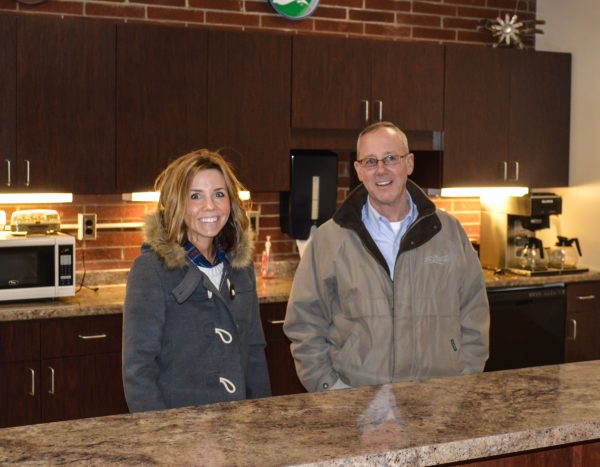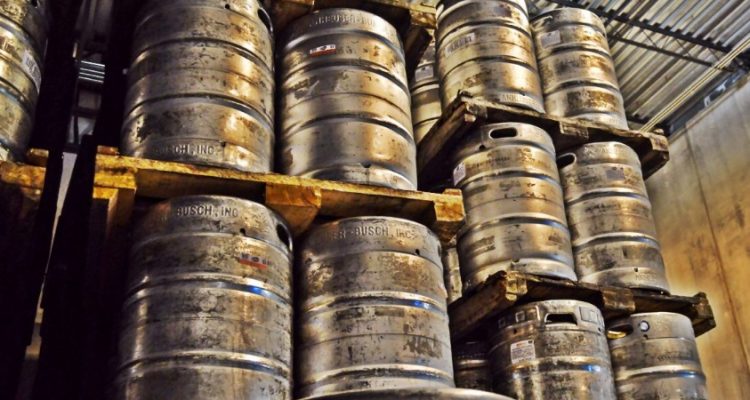By Steve Novotney
Weelunk.com
As the story often goes, the first generation of a business builds the business, and the second generation makes it grow. It’s that third generation that’s in question.
“And you know what that third generation usually does, right?” asked Carl Carenbauer.
“We already talked about it, Dad,” his daughter, Erin, said quickly. “I knew you were going to bring that up.”
“’They’ say – whoever ‘they’ are – that the third generation usually tears it all apart,” Carl continued. “But that’s not going to happen here, right?”
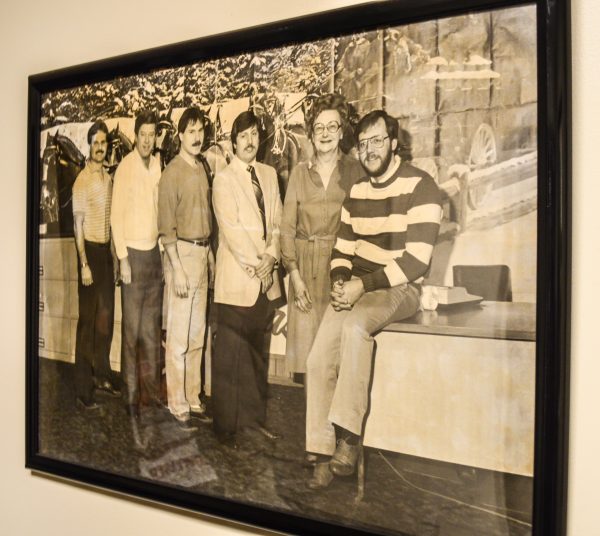
Erin has been involved with the business for as long as she can recall. It started with the production of promotional signs and now has expanded to all facets of the family’s distribution operation.
It was all made possible thanks to a decision made by Carl’s father, Edward, in 1946. That’s when he returned home from working a telephone company job in California to rejoin his wife and daughter in Wheeling. The plan was to sell beer – a beer he soon learned no one liked.
“It was his uncle, Albert Eick, who was a part owner of a brewery in Martins Ferry,” Carl said. “His uncle called him in California and asked him if he wanted to get into the beer business.
“Matz Beer – that’s what he started with, and two weeks after he started he went into one of the local places to see if he could sell it to the owner,” he continued. “The bartender was serving a guy at the bar, and he asked him what he wanted. The patron said ‘ABM,’ so the bartender went and got him a Black Label beer. My dad asked, ‘What’s ABM mean?’ The bartender answered, ‘Anything but Matz.’ That made my dad think, for sure.”
Fourteen years later, the founder of Carenbauer Distributing then made a bold move in 1960, when he purchased the rights to sell two more brands of beer – Budweiser and Stroh’s.
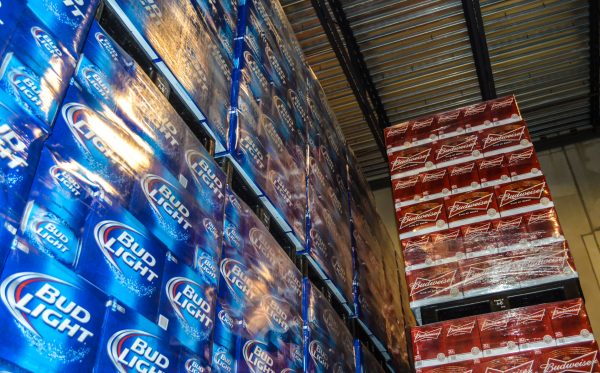
“Believe it or not, my dad was more interested in selling Stroh’s back then because Budweiser was a non-factor in this area at the time,” explained Carl, who has been married to Jackie since 1974. “People seemed to be more interested in the local beers like Black Label and Iron City, but Stroh’s caught on pretty quickly.
“In fact, my dad sold as much Stroh’s then as we sell Bud Light today,” he said. “But back then he was competing against maybe 10 other beers. These days the competition is far greater because not only do you have all the other brands, but now also all the craft beers that have come on the market.
“These days there are over 1,000 different brands of beer, and we have in this building more than 120 different kinds of beer that we sell today,” he said. “But because of the amount of Stroh’s he was able to sell, he was able to relocate the business to the building we’re in now.”
The father of two daughters graduated from Wheeling Central Catholic High School in 1971, and he joined the family business as a salesman as soon as he completed his marketing degree at WVU in 1975.
“When I came on board, we had five brands of beer we were selling – Stroh’s, Budweiser, Busch, Heineken, and Michelob – so there wasn’t very much confusion,” he said. “And at that time we were selling beer to over 250 bars and taverns in our area. Getting to all of those locations was the challenging part because that’s how we did business then.
“We didn’t have the Internet or cell phones back then,” he continued. “There was some business that took place on the telephone then, but mostly people preferred being face to face, and people preferred the handshake.”
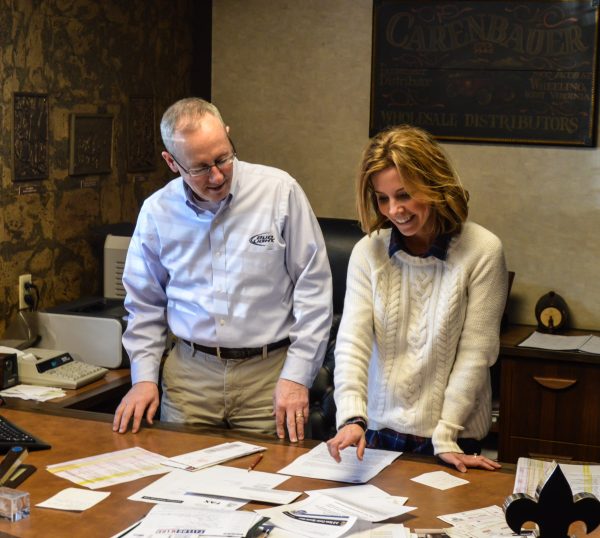
Carl became the president of Carenbauer Distributing in 1999, and his father, who continued coming to the office for three or four hours per day, passed away in 2011. He moved into his dad’s office, and he’s changed very little of the 1970-style décor.
“This is the way he liked it, and it’s the way I like it, so why change much?” he said.
“We’ve tried to talk him into painting and re-decorating,” said Erin. “But he’s refused. He’s gotten rid of a few couches, and he’s made some little changes, but nothing major. He likes it this way.”
Erin Moves Home.
She followed her father’s footsteps to Morgantown after graduating from Wheeling Central in 1997.
And WVU was fun, and she helped the family business often during her college years, but following her graduation, Erin moved to Pittsburgh. And she lived in busy places like Shadyside and on the South Side.
Pittsburgh can be fun, too.
And then there was that conversation with her father.
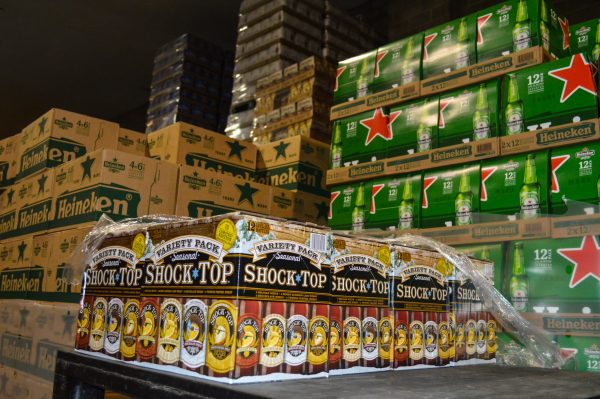
“It’s wasn’t really an ultimatum,” Carl said. “But it was a, ‘Hey-if-you’re-considering-a-move-home-anytime-in-the-future-now-is-the-time-to-do-it,’ conversation,” he explained. “I came to realize that I’m getting older, and I needed somebody. It was getting to be too much, and the members of our sales staff were getting older, too, so it was time for her to make that decision.”
Erin was 24 years old when that conversation took place, and today she’s the company’s vice president and in on everything. Erin can quote the names of the beer brands in the 33,000-square-foot warehouse as well as the daily delivery route schedule for Marshall and Ohio counties. She’s also in charge of community relations, and she is the “face” of the company.
“I looked around and there was nothing keeping me in Pittsburgh,” she said. “I had worked for a couple of public relation firms, but I didn’t love my job, and I wasn’t in a relationship at that time.
“And I’m really happy that I made that decision because of everything that’s taken place since,” Erin continued. “Not only do I love coming to work, but I met my husband, and we now have our own family.”
Erin married Brendan in May 2009, and they have two boys, Conner and Eddie.
“I consider myself extremely lucky that Erin decided to come home and join the business,” Carl said. “And the business is very lucky to have her on board, too, because of what she brings to the table. She’s the future of the business.
“Every parent I know would like to have their children close to them, so Jackie and I are lucky to have one of our two daughters not only here in Wheeling, but also working with me in the beer business,” he continued. “In this area, for a lot of years now, the kids have had to leave the area to find better job opportunities in other cities. That seems to be changing now, but that’s been the case for a long, long time.”
Both father and daughter have noticed improvement involving not only tangible economic development in the Wheeling area, but also with the overall attitude of local citizens. The gas and oil industries have helped, they both acknowledged, but more of Erin’s friends are living within the region, or they are considering a return.
“When I first got into the business, the population was higher than what it is now,” Carl said. “But I think the next 10 years in Wheeling are going to be a lot better than the past 10 years. I just get a feeling that things are finally turning around here.
“I think there is a more positive vibe out there right now,” he said. “Have we turned the corner? Absolutely not, but I think we need one or two more things to happen for that to be the case. Now what those one or two things are that need to happen in the downtown area, I’m not quite sure, but there are a lot of good things happening. Hopefully, we’ll see it kick into second and third gear.”
Erin believes involvement is the key to continued progress.
“We’re definitely on a positive ride right now, but I think more people need to jump on board,” she said. “There are a lot of people of all ages involved right now, but I would like to see it become the norm. Instead of groups like OVConnect recruiting new members, I’d like to see people coming to them to join because they want to be involved.”
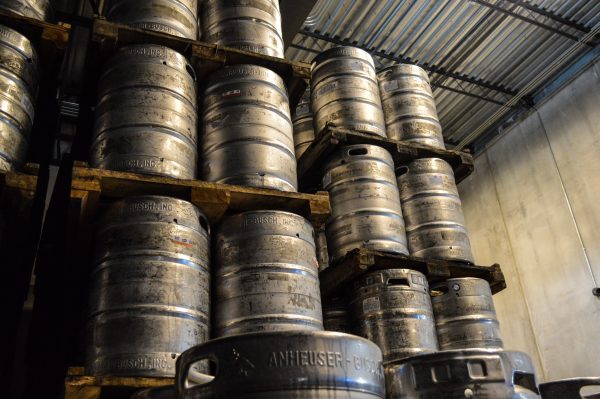
Do they drink beer all day?
“No, we do not sit around all day and drink beer,” said Erin. “There’s a lot more to it than that.”
“Well, not anymore, we don’t,” quipped Carl. “But back in the day when I was in sales?”
Much has changed in the beer business over the 40 years Carl has been in the beer business. In the mid-1970s, Carenbauer Distribution delivered 80 percent to bars and restaurants, and 20 percent to grocery and convenient stores. The current delivery routes now include 70 percent to retail locations.
“Beer wasn’t sold at gas stations when I started. That’s the biggest difference between today and back then. We’ve seen a complete reversal as far as where the beer is consumed,” he said. “Every year for the past 10 years the on-premise consumption has been declining and part of that is because of DUI laws; and that’s not a bad thing, but it’s certainly been a factor.
“And when I first came home from college and started working for my dad, there were a lot more neighborhood bars that people could walk to, but then we saw most of those go away for a lot of different reasons,” he continued. “People are staying home. They are having house parties on New Year’s Eve these days. Stuff like that. But I can tell that they are still buying beer.”
Carenbauer Distributing sells to businesses in Ohio and Marshall counties with a pair of delivery trucks traveling throughout Marshall County on a daily basis. The company’s other three trucks serve the Ohio County area.
Annually, according to Erin, approximately 800,000 cases are purchased.
“The month of July is our busiest time of the year, and then there’s also the time period around Thanksgiving and through Christmas and New Year’s,” she said. “It’s this time of year that is our slowest time. In July, we sell around 80,000 cases, but in January and February that decreases to about 50,000 cases.
“It makes sense if you think about it,” she continued. “At this time of year most people are spending the majority of their time inside, and they are going to bed much earlier than they do when it’s warm out and they are outside having more fun.”
Because of the continued success, the Carenbauers were able to purchase a vacant building adjacent to their East Wheeling property and construct more storage space and additional shipping docks. Two factors played key roles in the decision-making process – pressure from Anheuser-Busch to add pallet space in the warehouse and also a few hundred bricks that broke away from the neighboring empty structure.
“The building next to us was vacant for years.” Carl explained. “It was for sale for $400,000, and that was for the building and the land. And then a few years after I made that first phone call, part of that building came crashing down through our roof, and that’s when the price came down significantly.
“The expansion gave us another 8,000 square feet, and that put us up to a total of 33,000 square feet of storage and cooler space now,” he said. “So now we have plenty of space for whatever happens next in this business. It’s my experience that you never know.”
But Some Things Will Never Change.
The Carenbauers will not alter how they do business, according to the second- and third-generation representatives. For example, the distributorship employs 20 local folks all year long, and there are no seasonal employees hired during the hectic summer months.
In other words, there are zero layoffs in the winter.
Many of the company’s employees have made a career with the distributorship. Doug Hennen, for example, has been with Carenbauer’s for more than 30 years and is now the office manager.
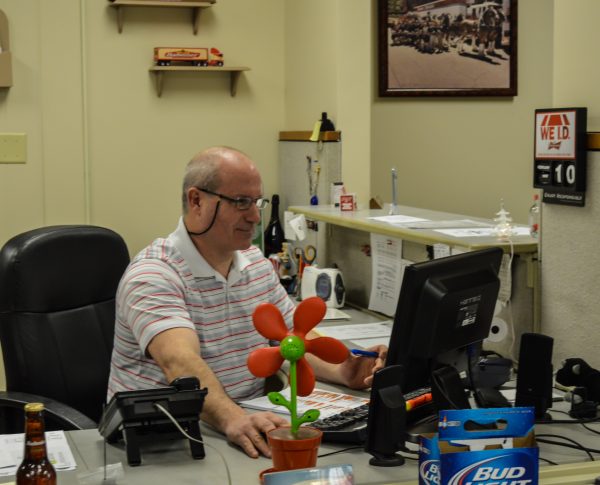
“My dad always made a point to take care of the people who took care of him because he felt that was the right way to do business,” Carl said. “And that’s continued because my dad was right. We’re more like a family most of the time than anything else.”
One challenge the beer industry has realized over the past 40 years has been the influx in beer brands on the national market. At one time, Carl explained, the “Big 3” – Budweiser, Miller, and then Coors Light – attracted most buyers, but today the rise of craft brewing has altered the game plan.
“Craft beers have been around for a long time, and the people in Wheeling are aware of that because that’s what Nail City tried to do about 15 years ago in the downtown,” Carl said. “For whatever reasons, now it’s very popular across the country, and in this area, too.
“The popularity of the craft beers has led us to sell a lot of the more popular brands and also a lot of crafts that are produced here in West Virginia,” he continued. “So that’s something to pay attention to in the coming years.”
Erin, though, is seasoned enough to realize the future of the craft-brewing industry is an undefined variable.
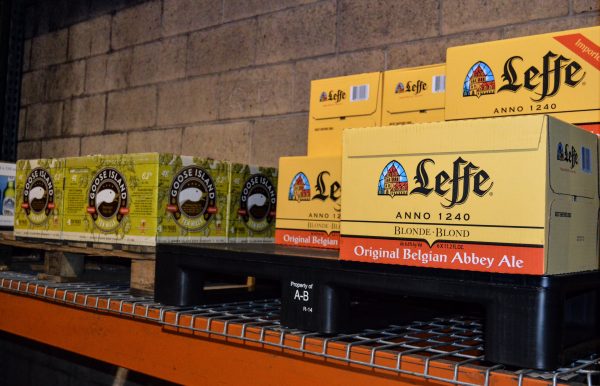
“And it’s an untold story at this point,” she said. “Who knows what is going to happen to the craft-beer industry? It has been growing and growing and growing the last few years, but how long that growth will take place, no one really knows at this point.
“Eventually, something is going to happen. Taste profiles are going to change because they always do, so what’s going to happen in the next 10 years, I have no idea. No one does,” Erin continued. “We also do not know what the breweries like Anheuser-Busch will come up with next, but whatever happens, we’ll be a part of it just like we are now.”
Carl has continued something else that his father found important – giving to local charities. He receives hundreds of requests each year, and he personally reviews each and every one.
In 2014, Carl even adopted a new cause when he decided to discover a local military family in need of a scholarship. The effort was a part of the Folds of Honor Campaign, and it involved two $5,000 scholarships for spouses and children of soldiers killed or disabled while serving the country.
“That was important to us as a family because we appreciate what our military members have done for our country through the history of the United States,” Carl said. “As far as all of the requests we receive, I try to say yes to as many of those events as I can,” Carl said. “It all depends on what the effort concerns, and we try to help out as many as possible.”
“That’s always been very important to our family,” Erin said. “And it’s a part of how we do our business because we realize that there are people in our community that need the help when the unexpected takes place.”
Carl insisted he owns no regrets for deciding to join his father 40 years ago this year. He’s made a good living, and he even enjoys a few brews from time to time. He and his wife often are seen still visiting those customers of his, and he’s remained hands-on at local events and festivals.
“There’s really not too many bad things about being in this business,” Carl said. “There are the crazy days, and there are the problems that anyone in business encounters, but for the most part we like coming to work in the morning. There are a lot more plusses than there are negatives to being in the beer business.
“It’s a very fun job mostly because of the relationships that I’ve developed with our customers over those 40 years. I can go into a bar that I haven’t been to for a couple of years, and it’s like I was there yesterday,” Carl said. “That’s because of how we go about what we do and also because they know how much we appreciate their business. Making sure they know that we do appreciate them is one of the biggest keys to this business.
“And hey, it’s pretty good being the ‘Beer Man,’” he added. “And I’m far from finished because I have a lot of fun, and I consider myself a very lucky man.”
